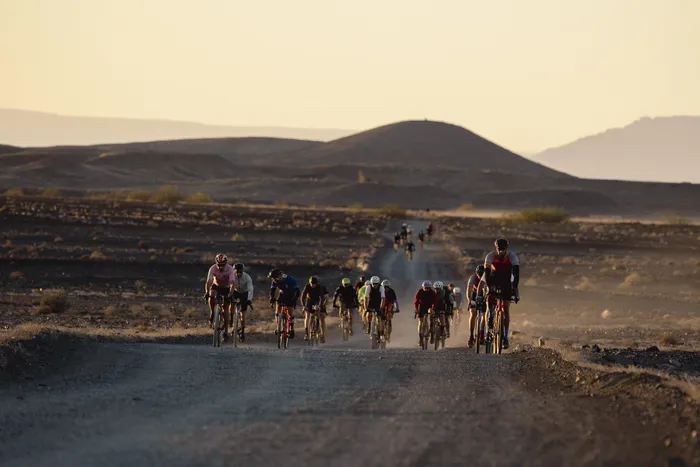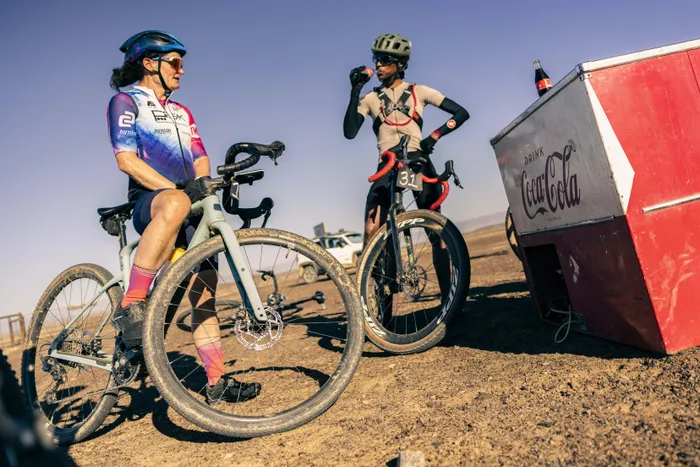The Tanqua Kuru rides high in South Africa’s cycling boom

As South Africa continues its remarkable sporting ascent – punctuated by world-class rugby wins, international cycling acclaim, and a growing hunger for adventure – one event stands out on the map not for its size but for its soul. The Tanqua Kuru Bicycle Race, now in its fifth year, has quietly become one of the most beloved and distinctive gravel cycling events in the country.
Image: maxsullimedia
As South Africa continues its remarkable sporting ascent – punctuated by world-class rugby wins, international cycling acclaim, and a growing hunger for adventure – one event stands out on the map not for its size but for its soul. The Tanqua Kuru Bicycle Race, now in its fifth year, has quietly become one of the most beloved and distinctive gravel cycling events in the country.
Held in the starkly beautiful Tankwa Karoo, Tanqua Kuru is not your average gravel race. It’s not just a test of endurance, although the course demands that in spades. It’s not just about the bike, although riders arrive on everything from state-of-the-art gravel machines to trusty mountain bikes and e-bikes. What truly sets Tanqua Kuru apart is its fusion of physical challenge, creative flair, and what organisers proudly call “radical hospitality”.
This year’s edition, held over the past weekend, was a milestone moment for the event and for the community it has built. Well-known African riders like Dan Craven and Martin Freyer crossed borders to take part, blending elite athleticism with the laid-back, everyone’s-welcome atmosphere that Tanqua Kuru is known for.
“It’s not just about speed – it’s about spirit,” says Jeremy Crowder, the event’s founder and driving force. “In a year where South African cycling is gaining serious global attention, we’re proud to be the race that reminds people why they started gravel riding in the first place.”

Globally, gravel cycling participation has doubled since 2020. South Africa is no exception. With its ever-diverse terrain and increasing international visibility—thanks in part to world-class performances in both road and mountain biking—the country has become a hub for cycling innovation. But in a sea of new races, Tanqua Kuru remains unmatched in authenticity.
Image: maxsullimedia
And it’s easy to see why so many return. Over 60% of Tanqua Kuru riders are repeat participants – an almost unheard-of number in mass participation events. That loyalty speaks volumes about what this race offers beyond the handlebars.
From a desert tiki bar waterpoint to ice-cold Coca-Colas pulled from a vintage fridge to a snack stop laced with music and good vibes, the event curates joy as much as it curates kilometres. It’s about the experience, the stories that unfold in the silence of the desert, and the surprise waiting around every dusty corner.
One rider summed it up best: “I came here to lose myself – instead, I found myself.”
Globally, gravel cycling participation has doubled since 2020. South Africa is no exception. With its ever-diverse terrain and increasing international visibility – thanks in part to world-class performances in both road and mountain biking – the country has become a hub for cycling innovation. But in a sea of new races, Tanqua Kuru remains unmatched in authenticity.
“There’s something about this race that gets under your skin,” said a returning rider. “You come here for the ride, but you leave with a story – and a family.”
In many ways, Tanqua Kuru represents a counterculture within sport. In a world increasingly dominated by data, results, and scale, it dares to be intimate, weird, and wildly human.
This spirit has also drawn in like-minded sponsors. One of them, Sling, has been a returning supporter. CEO Andrew Pitman explains why the race’s ethos resonates: “Tanqua Kuru reflects the pioneering values we live by. It’s bold, community-driven, and authentic – values that resonate far beyond cycling.”
For Crowder and his team, that’s the point. Built not on spectacle but on intention, the race keeps things grounded – even as its reputation soars.
“We started Tanqua Kuru to create something personal and a little bit wild,” says Crowder. “And it’s that magic – more than distance or difficulty – that keeps riders coming back year after year.”
As South African sport enters a new golden era, it’s easy to focus on the glitz: the full stadiums, the trophies, and the viral moments. But events like Tanqua Kuru remind us of something quieter and arguably more profound – that the real heart of sport lies not only in podiums but in connection.
On the backroads of the Karoo, in a place where time slows down and the stars stretch endlessly above, the Tanqua Kuru Bicycle Race proves that the future of South African sport is as much about shared sunsets and spirit as it is about medals.
Related Topics: